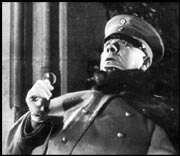CABARET
Egyptian, Fri., Feb. 7-Sat., Feb. 8
All of the excited hordes making Chicago a big hit should bow down and thank the first big hit adaptation of a Kander and Ebb musical: Cabaret. As razzle-dazzling as director Rob Marshall’s Golden Globe winner is, it would be nowhere without the inspiration of Bob Fosse’s 1972 classic— which did far more with a seamless m鬡nge of music and social commentary than Marshall ever achieves. In an Oscar-winning performance that will outlast her late-life insanities, Liza Minnelli plays an ambitious wanna-be desperately bedding admirers and entertaining revelers from a seedy nightclub in ’30s Berlin. Unlike Chicago‘s eye candy, Cabaret‘s decadent confection tastes very bitter. Minnelli looks great in garters, but the razor-sharp thrill of her musical numbers cuts deep. When she knocks home the title song, the kick is combined with the knowledge that the crowd is full of Nazis. (PG) STEVE WIECKING
THE GRAND ILLUSION
Grand Illusion, Fri., Feb. 7-Thurs., Feb. 13
Did any man ever look so handsome behind bars as Pierre Fresnay? (He probably used different combs for each side of his mustache.) And was any jailer ever more proper and polite than Erich von Stroheim? Part of the enduring wonder of Jean Renoir’s 1937 anti-war classic is how WWI is almost incidental to the plot. It’s as much a study in friendship (between Fresnay and von Stroheim as aristocrats, between Jean Gabin and Marcel Dalio as proletariat and bourgeoisie) as a portrait of conflict. This is a film where men love one another unconflictedly; a drag performance among the POWs causes no jokes because . . . well, it’s no joking matter. Yet the war makes strong men weep—I could swear to you that von Stroheim is on the verge of tears when he apologizes to Fresnay for shooting him. And after their escape, when fugitives Gabin and Dalio quarrel and then reconcile, you should cry, too. A masterpiece. (NR) BRIAN MILLER
LETTER FROM AN UNKNOWN WOMAN
Seattle Art Museum, Fri., Feb. 7
In Max Ophls’ 1948 Letter, Joan Fontaine plays a woman cursed/transfigured by a lifelong passion for a man (Louis Jourdan) so unworthy of her that every time he meets her and does her the dirty, he can’t even remember doing her the dirty before. This is not the ideal role for an actress whose expressive equipment is restricted to raising one eyebrow in a face otherwise as flat and featureless as a white porcelain plate. If crane and dolly and tracking shots get you going, Letter is one of the classics. If you like your cinema technique laced with a little drama, it’s a pretty stuffy 87 minutes. But if you want to air any complaints or praise, the U-Dub’s Willis Konick and psychotherapist Maxine Nelson will lead a post-screening discussion of the film. (NR) ROGER DOWNEY
STALINGRAD
Grand Illusion, Fri., Feb. 7-Thurs., Feb. 13
To make a good anti-war film, you’ve got to make a good war film, which the 1993 Stalingrad certainly is. One million people perished in the nearly yearlong German siege of the city during WWII. Of some 260,000 Third Reich soldiers subsequently encircled by the Red Army, only 6,000 made it home alive. A German platoon is led into battle by innocent Lieutenant von Witzland (Thomas Kretschmann, the music-loving officer who shows up at the end of The Pianist). What follows is idealism turned to bitterness and finally to nihilism. No one ultimately cares if they live or die—either proposition is rendered absurd by fanatical superior officers and the unforgiving Russian winter. “To sum up the situation,” says one German commander, “we’re in deep shit.” Later, a lowly soldier gives a better assessment of the horrifying sacrifices being made on both sides of the conflict: “All for nothing.” (PG-13) B.R.M.
UMBERTO D.
Seattle Art Museum, Wed., Feb. 5
Is this the greatest dog movie ever made? I don’t care how clever Lassie or Toto or Rin Tin Tin or Asta may have been, Flag is the dog for me. The little mutt is also the life force that keeps an impoverished pensioner clinging to his dignity in Vittorio De Sica’s 1952 neorealist classic. Carlo Battisti plays the aged former civil servant being threatened with eviction by his heartless blond floozy of a landlady. Some kind of Jack Russell terrier mix plays Flag, and they’re an unbeatable team. Umberto sells his books to make the rent and buy dog food, while Flag proves stoically willing to panhandle when his master is too ashamed. Four years after The Bicycle Thief, De Sica is still unsparing in his indictment of Italy’s postwar poverty and selfishness. The old social safety net of family and village is gone, and it’s everyone for himself. Thank God Umberto still has Flag. (NR) B.R.M. 




